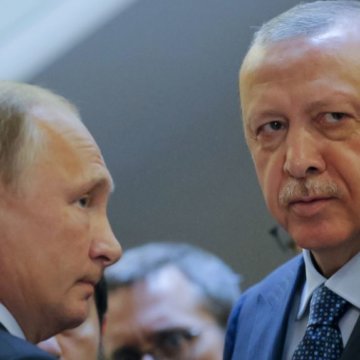- About
- Topics
- Picks
- Audio
- Story
- In-Depth
- Opinion
- News
- Donate
- Signup for our newsletterOur Editors' Best Picks.Send
Read, Debate: Engage.
| topic: | Peace and Reconciliation |
|---|---|
| located: | Russia, Turkey, USA, Syria |
| editor: | Igor Serebryany |
The agreement the Russian president Vladimir Putin struck with his Turkish colleague Recep Tayyip Erdogan on Tuesday in Sochi marks a U-turn for their cooperation over the Syrian domestic crisis and changes the power balance in the region dramatically, experts warn.
The two men agreed that Russian military police would patrol the strip alongside the Syrian-Turkish border as backup units for the Syrian government troops. Besides, Turkey calls off its “Source of Peace operation” while Kurds withdraw to 30 km south of the border. The Kurds must start withdrawal on Wednesday noon. They are given six days to clear off the area.
The Sochi agreement formally recognises the presence of the Russian-Syrian military in the Kurdish areas abandoned by the U.S. troops since last week. Thus, the “Source of Peace” looks like ending successfully for everyone involved in the current situation.
Turkey obtains a Kurd-free zone along its border. Damascus re-establishes control of that border. Kurds are relatively safe under the umbrella of Bashar Assad's and the Russian troops. Finally, Washington may now take a deep breath and leave Syria on its own.
Still, the principal beneficiary of the Sochi agreement has been Moscow, Karine Gevorgyan, an expert in Middle East affairs, says. "Moscow gains profit as a peacemaker in that embattled country. The day Turks invaded Syria, Kurds addressed Moscow asking to act as their proxy in negotiations with Damascus", she says.
Gevorgyan notes that Bashar Assad does not object that the Kurdish areas be "washed" by Turkish hands. "The thing is, the Kurds have been a natural base of the anti-Assad moderate opposition. Assad has been unwilling to give them even a limited cultural autonomy, let alone administrative one. But, obviously, in any case, Asad would act as he is ordered from Moscow", she stresses.
Russian FM Sergei Lavrov declared on Tuesday that Moscow did not welcome a Kurdish autonomy in any form either. Those remarks can potentially undermine the Kurdish trust in Moscow's neutrality towards the Syrian domestic conflict and encourage them to resume the armed fighting against both Syrian and Turkish "oppressors".
“For Moscow, good relations with Ankara means much more than what Kurds might think about Russia's "betrayal", Semen Bagdasarov, director of the Center for the Middle East and Central Asia Studies says.
"Russia needs joint economic projects with Turkey, the Turkish Stream pipeline, in the first hand. So, Moscow sees no point in intervening with the Kurds' favour if that would estrange Ankara. As an extra benefit, Moscow enjoys to observe the current quarrel between Turkey and the U.S. over Kurdish problem", he explains.

